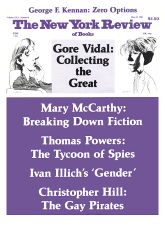In response to:
Twilight of Authority from the February 17, 1983 issue
To the Editors:
The notion, if not the name, of a “philosophical dictionary” goes back to Bayle’s Historical and Critical Dictionary (1697), and not just to Voltaire, as Ian Hacking implies in his review of Robert Nisbet’s recent exercise in this genre. These antecedents may help explain why Nisbet calls his book Prejudices, which Hacking finds inexplicable. Bayle’s skepticism entails that there is no distinction between “prejudices” and “reflective judgments” except that the former are better, because they are steadier in this quicksand and fallen world. Voltaire inverts the conventions of the genre. Nisbet works the main line (think of Bierce’s cynicism) by way of Burke’s claim that our prejudices are reliable because they are the products of long cultural selection.
It is indeed puzzling, as Hacking notes, that Nisbet calls these “his own” (private?) prejudices, but by calling them prejudices rather than judgments he is probably attempting to assure himself and his readers of their worth against this conceptual background. Meanwhile, Hacking is right in suggesting how quickly nostalgia for a lost communitarian world (itself the brain child of Right Romanticism) turns to the sanctification of oppression and cruelty, as in such latter day cant as Kirkpatrick’s distinction, repeated by Nisbet, between “authoritarian” and “totalitarian” regimes. Hacking is also to be commended for more glancingly intimating that a solid communitarian account of human flourishing must rest on something better than this old drivel. Otherwise the inanities of liberalism will continue to look good.
David J. Depew
California State University
Fullerton, California
Ian Hacking replies:
I am glad that Professor Weisskopf directs us to his fascinating lecture. I share the conviction stated in the last sentence of his letter, and agree entirely with what he went on to say in his talk, that “this emotional and social embedding of science is the precondition of the quest for scientific truth.” I also agree that Professor Nisbet’s slip makes little difference to what is said about Goedel’s results. Hence, sadly, I must quibble about Professor Weisskopf’s own words. Here is the paragraph from his lecture:
It must be pointed out that science itself has its roots and origins outside its own rational realm of thinking. In essence, there seems to exist a “Goedel Theorem of Science,” which holds that science is possible only within a larger framework of nonscientific issues and concerns. The mathematician Goedel proved that a system of axioms can never be based on itself: in order to prove its validity, statements from outside the system must be used. In a similar manner, the activity of science is necessarily embedded in a much wider realm of human experience. Science itself must have a nonscientific base: it is the conviction of every scientist and of society as a whole that scientific truth is relevant and essential.
In my review I was objecting to attributing nonsense to Goedel and to the illicit comparison between a precise mathematical result and conclusions such as “science must have a nonscientific base”—and also to Nisbet’s further inferences about science and religion.
I shall not repeat the rough sketch of Goedel’s second incompleteness theorem given in my review. The theorem is not, as Weisskopf and Nisbet say, about the basis for axioms or the “validity” of a system. It is about proofs of consistency of certain exactly defined classes of systems. (These are quite different ideas: for example, under any reasonable sense of the words, including the sense used in logic, a consistent system could fail to be valid.) As for the comparison between Goedel’s second incompleteness theorem and a so-called “Goedel Theorem of Science”: one way to prove the consistency of a given system of arithmetic of the appropriate sort is to add another arithmetical axiom (that is a “statement from outside the system” but hardly something “outside its own rational realm of thinking”). A general proof of the consistency of arithmetic uses stronger modes of proof, first developed by G. Gentzen in the 1930s; in some sense one moves to a wider realm of mathematical experience, but the sense is not one to invite conclusions about “a larger framework of nonscientific issues and concerns.”
In his fine lecture Professor Weisskopf drew together many strands of thought from our civilization. I believe that Goedel’s results from a delicate strand which is sufficiently profound that they ought to be stated correctly and, when so stated, ought not to be abused.
Professor Depew is entirely right about Bayle, although his analysis is perhaps a little more subtle than the present circumstances warrant. He will be familiar with what Voltaire himself wrote about Bayle:
Would to God that Bayle had been drowned along with the rest of the heretical Dutch! He sets forth things with such an odious accuracy, and puts the arguments for both sides before us with such shocking impartiality and is so intolerably intelligible that he puts even those of the most meagre understanding in a position to judge and even to doubt what is told them.
That would be a good model to follow, when writing a Philosophical Dictionary.
This Issue
May 12, 1983



